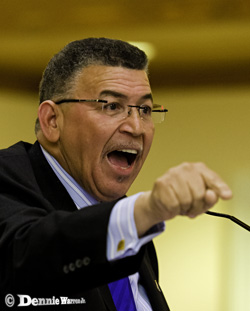Archive for August 25th, 2011

Bureaucrats ‘harass’ Mac
 (CNS): The country’s premier has accused officials of “bureaucratic harassment” when it comes to government policy. In a statement delivered on radio and TV Thursday evening the premier took aim once again at the auditor general and said that "so called good governance” experts were trying to make it look like his government was doing something wrong. McKeeva Bush said that he recognized that people were hurting but bureaucracy was stopping government from getting its projects done, which is what would help turn the economy around. He also told the people that he was only human and that “the constant accusations and persecutions” had taken a toll on him. (Photo Dennie Warren JR)
(CNS): The country’s premier has accused officials of “bureaucratic harassment” when it comes to government policy. In a statement delivered on radio and TV Thursday evening the premier took aim once again at the auditor general and said that "so called good governance” experts were trying to make it look like his government was doing something wrong. McKeeva Bush said that he recognized that people were hurting but bureaucracy was stopping government from getting its projects done, which is what would help turn the economy around. He also told the people that he was only human and that “the constant accusations and persecutions” had taken a toll on him. (Photo Dennie Warren JR)
Bush also berated officials in government for preventing him from changing committees because they wanted to keep their “yes” men on them. In his attack on bureaucracy he said the auditor general, as well as the opposition, were not telling the truth when they tried to imply his government was not managing the country's finances properly.
In a statement that was intended to deliver the good news about government’s current financial situation and in which he thanked hard-working civil servants, he took aim at those he said were getting in the way of what he wanted to do to turn the economy around.
“What I see happening is bureaucratic harassment!” Bush exclaimed. “The government needs to turn this economy around but how can we do anything at a quick pace when we have these so called good governance experts trying to make the government look like we are doing something nefarious?”
He said he knew that people in the community were hurting, not able to pay their electrical bills and some even losing their homes. As a result, he said, government should be able to act quickly to help people and he said that could only be done by getting projects moving quickly.
“Bureaucratic harassment is stopping us. I can tell you as your premier and someone who cares that I’m only human and I too have feelings. The constant accusations and persecutions have taken a toll on me. The Government wants tohelp but if I can’t change government committees because an official feels he will lose his “yes man” on it, how can we govern in your best interest? How can we get anything done?” he asked rhetorically.
He added that his government had worked hard to stabilize government finances and wanted to reduce the current debt burden. The announcement that government had achieved a surplus for last year proved “that the efforts of the audit office and the opposition to show that I am not managing the finances of these Islands properly is not true,” he said.
“Their assumptions and accusations is (sic) coming from individuals who are partially informed, spiteful and their main motive is to cause bureaucratic interference and harassment. As we know, there are two types of lies: there are those committed by commission and those committed by omission. The majority of those now being committed by these people who are opposers are those of omission,” Bush told the country in his broadcast, adding that he believed they were deliberately doing so.
Referring to the criticisms made by the auditor general in his report about government’s efforts to secure financing for government’s loan at a cheaper rate, Bush said he tried his “best to find a better solution” for the our country. “Had I succeeded, I would have saved this country over $24 million. And yes I would do it again as it is my duty to try and save money,” he said.
However, he said nothing about the recommendations the auditor had made or the reasons why the main watchdog of how public funds are spent had criticised the way the financing arrangements were conducted, which resulted in the premier losing the public purse a half million dollars.
Bush said that the figures released today but which government has been aware of for several weeks were a robust testament to the “good stewardship" of the government over the country’s finances.
He said Cayman’s economy was delicately poised to take-off but it needed the support of the people for government’s recovery efforts.
“The government is encouraged by the modest growth of the economy in the first quarter of 2011. Government is doing its part to aid the economy’s growth; I humbly ask that our people assist this recovery effort by acting for the national good,” he added.
Vote in CNS poll: Does McKeeva Bush's performance as premier match your expectations?
See the premier's full speech posted below.

$25m surplus for 2010/11
 (CNS): As a result of more income than expected and a cut in spending, the government has finished the 2010/11 financial year in the black, swelling the public purse with an a total surplusof $25 million against an expected deficit of more than $30 million. The positive result for government, Bush said in a statement, was down to the “sterling efforts” of government in guarding the islands’ finances. The premier explained that central government’s operating revenues was $535 million, which was $25 million more than had been budgeted in June 2010. With core government spending down to $483 million, $25 million less than expected, it was able to wipe out the anticipated deficit and move into a surplus.
(CNS): As a result of more income than expected and a cut in spending, the government has finished the 2010/11 financial year in the black, swelling the public purse with an a total surplusof $25 million against an expected deficit of more than $30 million. The positive result for government, Bush said in a statement, was down to the “sterling efforts” of government in guarding the islands’ finances. The premier explained that central government’s operating revenues was $535 million, which was $25 million more than had been budgeted in June 2010. With core government spending down to $483 million, $25 million less than expected, it was able to wipe out the anticipated deficit and move into a surplus.
The news comes in a statement the premier will deliver in a radio and television broadcast this evening (25 August).
“This is a tremendous testament to the prudent and responsible management of the country’s finances by the government,” Bush said as he congratulated and thanked all “the hard-working civil servants that contributed to this great achievement.”
With interest costs down by $3 million less than budgeted because government delayed taking out its $155 million loan, Bush said this was because government was “managing prudently” and watching revenues and expenditures, enabling it to stretch the time before it became critical to borrow.
Bush said this despite the fact that government had needed to take out a short term loan in October of $78 million and then another emergency loan in December of more than $30 million because it was unable to pay bills, according to details in the recent auditor general’s report. Bush claimed, however, that he had saved the country some $3 million in interest by delaying the main loan.
He stated that this was something the auditor general never took into consideration when they talked about what was paid as a result of the financing negotiations. “They never said we saved $3 million,” he said, referring to the latest report from Alastair Swarbrick’s office about government procurement and the events surrounding the financing of the $155 million loan approved by the UK Foreign Office.
Bush noted that instead of a $31 million deficit, central government made a surplus for the 2010/11 financial year of $22 million. The statutory authorities and government companies were expected to produce a deficit of around $1 million but instead, Bush said, a surplus of almost $3 milllion has been reported, bringing government’s surplus up to $25 million. He said this represented a turnaround in public finances, compared to the budget his government had said it would deliver, of some $59 million.
“Government well understands the need for the provision of timely information, and the importanceof certainty of information,” Bush stated as he explained that the results would be sent to the Office of the Auditor General for examination. He said while there may be some normal adjustments, government didn’t expect any significant revisions. “We firmly believe that we have struck a good balance between these two factors by waiting until now to announce this information,” Bush stated as he went on to criticise the opposition for their comments about the budget earlier in the year.
“I should say that everyone knows how much the opposition berated me before the new budget was presented, saying I wouldn’t reach the $15 million surplus I was asking civil servants to achieve; but once again the opposition is proven wrong, and I will continue to prove them wrong as the difference is, I have good ideas. I have the right plan to bring investment, give the government revenue and our people jobs. The opposition is at the opposite end, doing nothing with no plan,” he added.

Law delayed CCTV contract
 (CNS): Although the auditor general said that the tendering process for the installation of the public CCTV to fight crime was mostly in accordance with the proper procedures, Alastair Swarbrick highlighted a significant number of concerns about the contract after the tender was selected. He said there were numerous concerns, from delays on the project to the lack of a cost analysis, as well as a failure by government officials to follow proper procedure. Swarbrick also stated that, after a sense of urgency surrounded the project as a solution to the country's crime problem, government took almost a year to bring the necessary legislation to the Legislative Assembly required to facilitate the installation of the cameras.
(CNS): Although the auditor general said that the tendering process for the installation of the public CCTV to fight crime was mostly in accordance with the proper procedures, Alastair Swarbrick highlighted a significant number of concerns about the contract after the tender was selected. He said there were numerous concerns, from delays on the project to the lack of a cost analysis, as well as a failure by government officials to follow proper procedure. Swarbrick also stated that, after a sense of urgency surrounded the project as a solution to the country's crime problem, government took almost a year to bring the necessary legislation to the Legislative Assembly required to facilitate the installation of the cameras.
Swarbrick said the first delay came from Cabinet halting the proceedings and asking the Portfolio of Internal and External Affairs a series of questions about the bid, which he said caused angst among the bidders and went against the principles of good procurement practice.
Although there had been concerns about the CCTV bid because of the portfolio DTC Eric Bush’s relationship with one of the bidders, Swarbrick said that Bush had recused himself from the process and had nothing to do with the bid, including the creation of the request for proposals (RFP).
Swarbrick said that the trouble with the CCTV bid lay in other areas, including the fact that the business case for the project was weak. He said the IEA had not analysed the situation or looked at cost options but had simply acted on information from the RCIPS.
“We expected that a project such as the CCTV programme would have a robust business case that included a complete review of options to address the business needs identified," the auditor wrote in the report. “As well we expected that the business case would include not only the cost of installing hardware and software but also the cost of ongoing operations.”
However, the auditor found that the annual running costs of more than half a million dollars were only revealed to Cabinet a few weeks before this year's budget. “This information was not made available to legislators when the programme was approved as part of the 2010/11 budget. By that time it was too late to make a decision not to proceed,” he added.
Given the circumstances, the auditor recommended that government entities must make detailed business cases for major projects in order to demonstrate value for money, as outlined in the financial regulations.
Swarbrick stated that aside from the delay caused by Cabinet stopping the process just days before The Security Centre was to be informed officially, the real delay was caused by government's failure to enact the necessary law.
“We believe the government did not do enough to ensure (the project) was completed in a timely fashion recognizing the importance of the programme to the objectives it was trying to achieve," the report reveals. “When it was approved, there was considerable urgency associated with the need for a camera system as a key component to achieve the wider range objective to reduce crime.”
However, although the project team had identified the need for a change in the ICTA law in relation to using CUC poles to mount the cameras and carry the network, it was months before the law was changed. The ICTA was told in June 2010 to start work on revising the law but it did not reach the LA until eleven months later.
“The ICTA did not take the necessary action on a timely basis," Swarbrick stated. He said it was outside his office's remit to review what happened but he recommends that government take action to find out what did cause the unacceptable delay and prevent similar delays in the future.
A further criticism that the AG has of the CCTV contract was the advance payment made to The Security Centre of more than $344,000 — some 25 percent of the cost of the project. Swarbrick pointed out that as government has no guidelines in place relating to advance payments, there is no way of knowing if this was warranted and, more importantly, if the risk to public money was properly managed.
The auditor said that advance payments are sometime needed but should only be made with proper guidance to ensure government considers the financing and interest costs as well as the risks involved and he said in this case there was no evidence to show the need for the payment or any consideration made about it by government officials.
The auditor also criticised the fact that the change orders made after the contract was awarded were done so under criteria established by the contractor and not government. When the AG pointed out the trouble, he said the portfolio rectified the situation but to date over a half a million dollars has been added to the original contract.
Another problem found by Swarbrick was that the portfolio had split a separate project management contract related to the CCTV into three to avoid tendering, when really it should have been one contract. The report reveals that the portfolio gave three contracts to help install the system to a consultant company called Security Risk Management Consultants in Columbus, Ohio, each of which was worth $48,580 but totalled more than $145,000.
According to the financial regulations, although only contracts over CI$250,000 need to go through the CTC, government departments should still put any contract worth more than $50k out to competitive tender. In this case, because the portfolio split up what was in reality one contract, it avoided that process, essentially circumventing the rules.
“It is clear in this case that the contracting process was structured to avoid the intent of the financial regulations," Swarbrick said. “We found little or no evidence that the time spent by the contractor could be identified as being associated with one contract or another.”
The auditor further revealed that since contracts were signed with the firm $147,000 has been spent and a contract amendment has increased the total value to $175,000.
Swarbrick said government must put in place guidelines to stop government officials circumventing the rules.
See report Auditor General's report on case studies below

Customs to see in containers without even looking
 (CNS): Officers from the customs department will soon know exactly what is in people’s containers without even opening them, as a result of purchasing state a of the art high energy X-ray cargo inspection system to cut the flow of weapons, narcotics and contraband in and out of the country. The close to $3milllion contract was awarded to Smiths Detection Supplies which the Caribbean firm states is its largest contract to date. The system distinguishes between organic and inorganic substances by using color-coded material discrimination.
(CNS): Officers from the customs department will soon know exactly what is in people’s containers without even opening them, as a result of purchasing state a of the art high energy X-ray cargo inspection system to cut the flow of weapons, narcotics and contraband in and out of the country. The close to $3milllion contract was awarded to Smiths Detection Supplies which the Caribbean firm states is its largest contract to date. The system distinguishes between organic and inorganic substances by using color-coded material discrimination.
Jeff Jackson, Assistant Collector project coordinator said the acquisition of the HCVM which is the most advanced technology of its kind in the Caribbean demonstrates the department’s commitment to combat drug smuggling and other prohibited items and safeguard customs revenue.
In a release Smiths said the HCVM uses viZual threat identification technology which allows the detection of narcotics and other suspect substances hidden in standard commercial shipments. Coupled with other HI-SCAN Cargo Inspection Systems, the full array of scanners will help reduce the need for manual inspections by showing customs officials that goods in containers match those declared on the manifest.
Eduardo Parodi, Director of Sales for Latin America & Caribbean, Smiths Detection, said: "This is Smiths Detection's fifth High Energy System deployed in the region; all our systems have had a strong history of return on investment for their end users in terms of narcotics seizures as well as revenue collection. The effective use of advanced technology supported by our investments in regional service capabilities truly allows Smiths Detection to stand out among competing manufacturers."
Smiths Detection deploy more than 65,000 X-ray inspection units in more than 180 countries, 6,000 desktop explosives trace detection systems, 186,000 chemical detectors, and around 500 cargo inspection systems worldwide. It is part of Smiths Group which employs around 23,000 people in more than 50 countries.
According to information on the CTC website it was awarded the contract officially in May and is now required to provide customs with an effective way of verifying that the contents of either an imported, in-transit or exported cargo container at the port and other inspection sites correspond to the manifest or do not conceal forbidden or controlled items.
Smiths will not only provide the fully mobile X-ray inspection systems but will install the system and deal with the maintenance and service and after sales support.

Bankers say FATCA makes them tax collectors
 (Reuters): A U.S. law meant to snuff out billions of dollars in offshore tax evasion has drawn the criticism of the world's banks and business people, who dismiss it as imperialist and "the neutron bomb of the global financial system." The unusually broad regulation, known as FATCA, or the Foreign Account Tax Compliance Act, makes the world's financial institutions something of an extension of the tax-collecting Internal Revenue Service — something no other country does for its tax regime.
(Reuters): A U.S. law meant to snuff out billions of dollars in offshore tax evasion has drawn the criticism of the world's banks and business people, who dismiss it as imperialist and "the neutron bomb of the global financial system." The unusually broad regulation, known as FATCA, or the Foreign Account Tax Compliance Act, makes the world's financial institutions something of an extension of the tax-collecting Internal Revenue Service — something no other country does for its tax regime.
Conceived as a way to enlist the world in a crackdown on wealthy Americans evading tax, it gives global financial institutions and investment entities a choice: either collect and turn over data on U.S. clients with accounts of at least $50,000, or withhold 30 percent of the interest, dividend and investment payments due those clients and send the money to the IRS.
Foreign institutions and entities that refuse, or fail, to do so face bills for the taxes due, a draconian penalty of 40 percent of the amount in question and heightened scrutiny by the IRS.
"FATCA is a blunt instrument for which foreign banks have no choice but to each spend tens of millions of dollars to help the U.S. enforce its own tax law," said Scott Michel, a tax lawyer at Caplin & Drysdale in Washington, D.C.

10th storm brewing as Irene ploughs through Bahamas
 (CNS): In the early hours of Thursday morning the tenth tropical depression of the season formed some 435 miles WSW of the southernmost Cape Verde Islands. The NHC stated that the depression was expected to become a storm sometime today. Meanwhile, Irene is still battering the Bahamas causing extensive damage on some of the country’s smaller islands. At 10am local time the NHC said Irene was around 75 miles NNE of the capital Nassau which is believed to have escaped the worst of the hurricane. Irene is moving towards the north-northwest at 13 mph with maximum sustained winds of almost 115 mph making the storm a category three dangerous hurricane with further strengthening possible today or tonight.
(CNS): In the early hours of Thursday morning the tenth tropical depression of the season formed some 435 miles WSW of the southernmost Cape Verde Islands. The NHC stated that the depression was expected to become a storm sometime today. Meanwhile, Irene is still battering the Bahamas causing extensive damage on some of the country’s smaller islands. At 10am local time the NHC said Irene was around 75 miles NNE of the capital Nassau which is believed to have escaped the worst of the hurricane. Irene is moving towards the north-northwest at 13 mph with maximum sustained winds of almost 115 mph making the storm a category three dangerous hurricane with further strengthening possible today or tonight.
Hurricane force winds currently extend outward up to 70 miles from the centre but tropical storm force winds extend outward a further 290 miles.
Forecasters expect Irene to continue on its NNW track through tonight with a turn toward the north by early Friday. The core of the hurricane will move over the north-western Bahamas today and pass well offshore of the east coast of central and north Florida tonight and early tomorrow. Irene is forecast to approach the coast of North Carolina on Saturday.

Police still have leads in missing person enquiry
 (CNS): Although police still do not know what has happened to twenty five year old Kerran Baker who has been missing since the end of July a senior officer said Wednesday that this does not mean that there are no lines of enquiry. CI John Jones said that the police are still pursuing a number of leads and have collected considerable information during the investigation but it was not necessarily in the interest of the case to reveal what they know. Jones also added there were still people out in the community who knew more than they were telling police and he urged them to come forward.
(CNS): Although police still do not know what has happened to twenty five year old Kerran Baker who has been missing since the end of July a senior officer said Wednesday that this does not mean that there are no lines of enquiry. CI John Jones said that the police are still pursuing a number of leads and have collected considerable information during the investigation but it was not necessarily in the interest of the case to reveal what they know. Jones also added there were still people out in the community who knew more than they were telling police and he urged them to come forward.
“The fact that we have not got to bottom of where Kerran is doesn't mean that we have got no leads,”Jones said. “We are just not sharing the details of these leads because it is not going to benefit the investigation. There are certain sensitive areas regarding some of the lines of enquiry.'
Jones said however, the investigation team which consists of 15 officers was still pursuing several very specific lines of enquiry and when the time was right or when it became a benefit to the case the police would reveal more.
Detective chief Inspector Mike Chadwick who is head of CID and the senior investigator in charge of the missing person enquiry echoed Jones' comments when he said not every part of the police probe was for public consumption in order to protect what may become a criminal case.
“There are a number of lines which are still outstanding which we can't detail as it would not be healthy for the enquiry but we are discussing the issues with Kerran's family,' Chadwick said. “We have been very honest and open with the family and what we don't share is for good reason. If it becomes a murder enquiry we do not wish to prejudice the investigation'
The officers once again indicated that it was apparent that Kerran and not disappeared through choice and that it was likely she was the victim of a crime and someone out there knows what happen to Kerran.
John Jones said he believed there were people who knew more than they were revealing that may be able to assist the police but for whatever reason had not come forward with that information and he urged them to reveal what they know,.
“We are pretty sure there are some people who know more than they are letting on,” he said. “We need them to think about the stance they are taking everyone has seen the nightmare that Kerran's parents are going through.'
Jones said things were not getting better for them with the passage of time as Kerran remained missing, he said things got worse and asked those who may have information to think about if it was one of their family members.
Jones also had a message for who ever was out there that may have harmed Kerran when he said they would have a terrific weight on their conscience but the police would not rest until the person was brought to justice if they were responsible for any crime.
Kerran Natale Baker (25), a Jamaican national also known as KerryAnn, has lived and worked in Cayman for the last two years at a doctor's surgery. She was last seen on CCTV footage at Foster’s Supermarket near the airport at 7pm on 30 July. Kerran was reported missing to the police on Sunday 31 July after a friend had visited her apartment and found half unpacked groceries on the counter in her apartment in Bodden Town alongside her handbag.
Her white car was discovered parked at Pedro St James around noon on Monday 1 August and the keys were found in the bushes around fifty feet away the following day.
Anyone who may have information on the whereabouts of Kerran is asked to call any of the local police stations, the crime hotline 949 7777, Wilmot Anthony Kerran’s father 321 4271 or Crime Stoppers at 800(TIPS) 8477.

DoT failed to bid $1.2m job
 (CNS): The auditor general has revealed that the tourism department completely failed to engage in a tendering process for a contract worth more than $1.2million for the 2009 Jazzfest in contravention of the PMFL regulations. In Alastair Swarbrick’s latest report he reveals that the department simply ignored the requirement for government contracts worth more than $250,000 to go through a tendering process and instead just gave the job of producing the government financed musical festival to BET without any competitive bidding. Swarbrick said at a press conference Wednesday that the responsibility for this significant breach in the regulations and procedures lay with the chief officer or the deputy governor. (Left: Alica Keys at Jazzfest)
(CNS): The auditor general has revealed that the tourism department completely failed to engage in a tendering process for a contract worth more than $1.2million for the 2009 Jazzfest in contravention of the PMFL regulations. In Alastair Swarbrick’s latest report he reveals that the department simply ignored the requirement for government contracts worth more than $250,000 to go through a tendering process and instead just gave the job of producing the government financed musical festival to BET without any competitive bidding. Swarbrick said at a press conference Wednesday that the responsibility for this significant breach in the regulations and procedures lay with the chief officer or the deputy governor. (Left: Alica Keys at Jazzfest)
In his report the country’s public auditor reveals that despite section 37 of the public management and finance law regulations the department of tourism awarded a contract worth CI$1,252,522 to BET Event Productions (BET) without a competitive bid despite the fact that there were numerous other companies who offer the same services. He also revealed that as well as being subject to a public tendering process the contract should also have been subject to the oversight of the Central Tenders Committee.
The report also reveals that as part of the contract BEP was supposed to acquire written approval from DoT for any contracts or commitments it entered into with other firms, artists or subcontractors. However, Swarbrick said that in several cases this was not done and added that finding documentation during this audit in connection with these contract proved very challenging. In addition there was no evidence of any signed contracts with those who were sub contracted to do the technical work related to the shows in several cases.
He noted that there was no way to say if government received value for money on the overall contract and he said significant risks had been taken with public money especially given the size of advance payments that were made to the artists which were signed up for the 2009 festival.
“In our review of the contract, we noted that most of the artists’ contracts, a significant part of the contract amount, called for all of their fees to be paid prior to the event. We believe the advance amounts were excessive and that undue risks were taken by DoT officials,” the report reveals.
Speaking to the media on Wednesday morning Swarbrick said that the decision by DoT officials to just not bother with a tendering process was one of the reasons why the Jazzfest 2009 had been selected by his office to be one of the case studies used to illustrate the problems that arise as a result of the failure to follow proper procedure when it comes to spending public money.
He said in this case the accountability for the contravention of the PMFL regulations lies ultimately with the chief officer in the ministry and the deputy governor. He said despite the fact that the law had been breached however; the audit office had not yet approached the attorney general in connection with any legal proceedings. Swarbrick said that the office was still considering what action it would take in connection with all of the things it discovered during the course of its overall investigations into the management of government procurement.
In the meantime, however, the auditor noted that he had made a further eleven recommendations in this report for government to consider as ways of addressing the wide and fundamental failings of the system. He also pointed out that the report was now in the hands of the country’s elected officials and it would be up to the legislators and the Public Accounts Committee to assess his findings and if necessary demand accountability.
See the Auditor General’s latest report below.